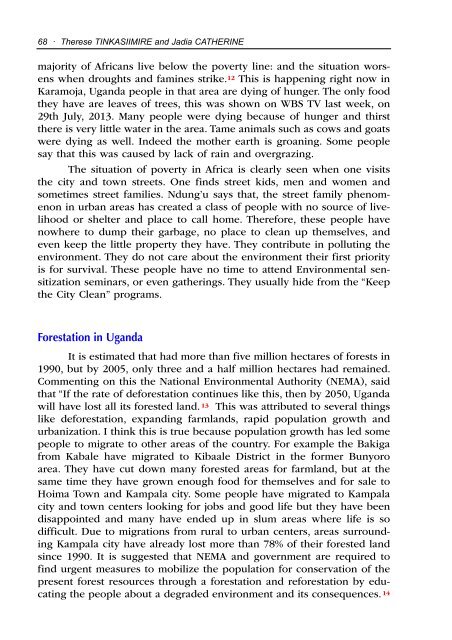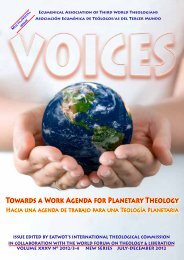voices-2013-2&3 - EATWOT's International Theological Commission
voices-2013-2&3 - EATWOT's International Theological Commission
voices-2013-2&3 - EATWOT's International Theological Commission
You also want an ePaper? Increase the reach of your titles
YUMPU automatically turns print PDFs into web optimized ePapers that Google loves.
68 · Therese TINKASIIMIRE and Jadia CATHERINEmajority of Africans live below the poverty line: and the situation worsenswhen droughts and famines strike. 12 This is happening right now inKaramoja, Uganda people in that area are dying of hunger. The only foodthey have are leaves of trees, this was shown on WBS TV last week, on29th July, <strong>2013</strong>. Many people were dying because of hunger and thirstthere is very little water in the area. Tame animals such as cows and goatswere dying as well. Indeed the mother earth is groaning. Some peoplesay that this was caused by lack of rain and overgrazing.The situation of poverty in Africa is clearly seen when one visitsthe city and town streets. One finds street kids, men and women andsometimes street families. Ndung’u says that, the street family phenomenonin urban areas has created a class of people with no source of livelihoodor shelter and place to call home. Therefore, these people havenowhere to dump their garbage, no place to clean up themselves, andeven keep the little property they have. They contribute in polluting theenvironment. They do not care about the environment their first priorityis for survival. These people have no time to attend Environmental sensitizationseminars, or even gatherings. They usually hide from the “Keepthe City Clean” programs.Forestation in UgandaIt is estimated that had more than five million hectares of forests in1990, but by 2005, only three and a half million hectares had remained.Commenting on this the National Environmental Authority (NEMA), saidthat “If the rate of deforestation continues like this, then by 2050, Ugandawill have lost all its forested land. 13 This was attributed to several thingslike deforestation, expanding farmlands, rapid population growth andurbanization. I think this is true because population growth has led somepeople to migrate to other areas of the country. For example the Bakigafrom Kabale have migrated to Kibaale District in the former Bunyoroarea. They have cut down many forested areas for farmland, but at thesame time they have grown enough food for themselves and for sale toHoima Town and Kampala city. Some people have migrated to Kampalacity and town centers looking for jobs and good life but they have beendisappointed and many have ended up in slum areas where life is sodifficult. Due to migrations from rural to urban centers, areas surroundingKampala city have already lost more than 78% of their forested landsince 1990. It is suggested that NEMA and government are required tofind urgent measures to mobilize the population for conservation of thepresent forest resources through a forestation and reforestation by educatingthe people about a degraded environment and its consequences. 14





